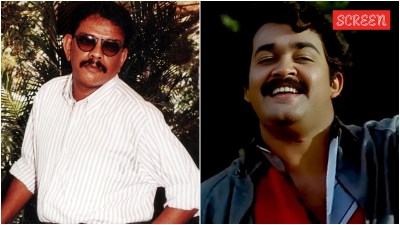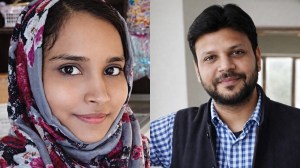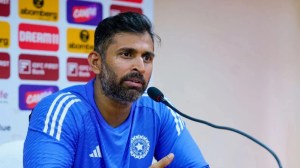Red Cross officials lecture, BSF commanders listen
BSF Section Commanders know the insides of this brightly-lit conference room in Srinagar well enough. They have held countless meetings here...

BSF Section Commanders know the insides of this brightly-lit conference room in Srinagar well enough. They have held countless meetings here discussing how to neutralise militants in hideouts.
Today they again gathered8212;in rapt attention8212;at the room, but the agenda was completely different. With the Hurriyat Conference threatening to walk out of the peace talks unless the Government put an end to human rights violations in the Valley, the BSF officials were taking lessons in human rights from the International Committee of the Red Cross ICRC.
Sitting in rows, the 20 BSF Section Commanders were told their new manual of operations has to take into account the International Humanitarian Law IHL, that their duty included making a distinction between a militant and a civilian, and that the safety of a civilian was paramount. Among those present was DIG, BSF, Virendra, assiduously taking notes.Lasting three hours, this was the first in a series of workshops planned by the ICRC for security officers operating in the Valley.
8216;8216;You cannot torture a person, though you have the right to imprison a person you deem a threat to security. The detainee has a right to life8230;torture is prohibited, along with degrading treatment or violence to a life,8217;8217; lectured Robert Przedpelski, the ICRC deputy head of the regional delegation for South Asia. Officers flipped through an ICRC booklet on code of conduct for combatants. It called upon security officials to protect civilians against ill-treatment as well as to ensure safety of their property. Speaking through a translator, Przedpleski elaborated: 8216;8216;If you get a report about militants hiding in a village, protected by their sympathisers, you have to be careful to ensure safety of the civilians, which in all conditions is paramount. You have to treat those in your power humanely and even if you capture a militant, disarm him and hand him over to your superior.8217;8217;
When some BSF officers wondered how they were expected to rush a militant injured in a gunfight to hospital knowing he had just killed a comrade, Przedpleski admitted that sometimes some aspects of human rights could be suspended in conflict situations. 8216;8216;You can suspend the freedom of meeting if it compromises security and you can even suspend the freedom of speech and movement,8217;8217; he said. However, he emphasised: 8216;8216;You cannot take hostages or rape a woman or torture a person.8217;8217;
A BSF officer asked about the ICRC8217;s frequent visits to jails and queried if it had ever been able to change a militant8217;s political opinions. 8216;8216;We work in 80 countries where we meet people in custody. Not criminals, just people involved in an armed conflict,8217;8217; said the ICRC deputy head. 8216;8216;As for whether we try to change views of the detainees, we don8217;t get into politics. It8217;s not our job.8217;8217;
Emerging from the hall, the BSF officers looked satisfied. A Section Commander deployed in the city said: 8216;8216;We had some knowledge about human rights passed on to us by our officers. But today we learnt more on what can be done to improve the human rights record. I will pass it on to my other colleagues.8217;8217;
The ICRC is confident of cementing its relationship with the BSF through these workshops. 8216;8216;We8217;re encouraging them to integrate rules of the IHL in thier manual, which could improve the overall human rights conditions,8217;8217; said Przedpelski.
The BSF too wants to make the workshops a regular feature. 8216;8216;These would enable our jawans to understand IHL and human rights, and once they know about it, they would have no problem implementing these on the ground,8217;8217; the BSF DIG said.
- 01
- 02
- 03
- 04
- 05































